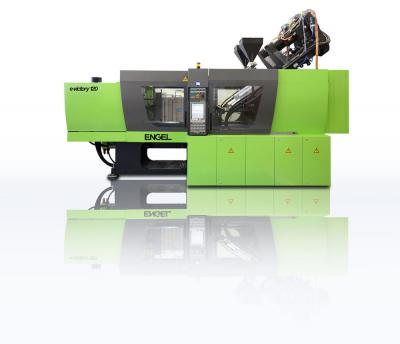Dec 11 2012
To date, it has been very laborious to manufacture fiber-reinforced composites with a thermoplastic matrix in large quantities.
On the one hand, the textile-like dense continuous fiber-reinforced structures are difficult to shape, on the other, joining the continuous fibers with a highly viscous thermoplastic matrix material is a highly complex process. To date, there is no economically profitable production technology for large-volume component series.
 Using the ENGEL e-victory 120, thermoplastic composite structures can be mass-produced using the injection molding process. Credit: ENGEL
Using the ENGEL e-victory 120, thermoplastic composite structures can be mass-produced using the injection molding process. Credit: ENGEL
Adapted injection molding process
Together with the injection molding machine manufacturer ENGEL Austria GmbH, the scientists of the Fraunhofer Institute for Chemical Technology ICT in Pfinztal (Germany) have, for the first time, brought a technology to production readiness that allows the series production of such continuous fiber-reinforced thermoplastic composites with an injection molding process. So far, it has only been possible to use the injection molding process for fiber-reinforced composites made of short fibers or long fibers. "Continuous fiber-reinforced composite structures with a thermoplastic matrix are becoming increasingly popular, and will be used increasingly in the automotive industry", states Dr.-Ing. Lars Fredrik Berg, scientist and project manager at the ICT. "With the injection molding process, components that have high fiber contents by volume and therefore outstanding mechanical characteristics can be produced efficiently in high volume series".
Based on the results of their own research, the scientists of the ICT developed, together with ENGEL, a prototype machine for injection molding. The ENGEL e-victory 120 can handle all the necessary working steps in a single machine. The reactive components are prepared and mixed, and the material is injected into the molding die. The in-situ polymerization also takes place in it, after the textile reinforcement structures have been introduced. "The ICT and ENGEL have developed a robust, compact and fully automated technological system to series readiness that is flexible and quick at the same time. It is exactly this technology that the automotive industry has been lacking for continuous fiber-reinforced thermoplastic composite structures. The process, which to date had been distributed across several machines, can now be carried out on a single one", says Dipl.-Ing. Peter Egger, Head of the Technology Center for Lightweight Composites at ENGEL. e-victory has already passed its first crucial test: Engel produced, as an example, a brake pedal insert made of fiber glass-reinforced polyamide for the automotive supplier ZF Friedrichshafen.
Endless fiber structures wetted out ideally
In contrast to the injection molding processes for fiber composite materials to date, where only short fibers could be processed, continuous fiber-reinforced composite structures can be fed into the e-victory and be impregnated with a very low viscosity plastics matrix. "We have developed a process in which the in-situ polymerization of thermoplastic matrix materials works. We allow monomers, which are highly reactive molecules, to polymerize directly in the machine. The monomers have a shorter molecule chain than polymers, and therefore a lower viscosity. When being processed, the viscosity of the reactive plastics matrix is similar to that of water. This means that the fiber structures can be wetted down in an ideal manner, without displacing the structures in the form", explains Berg. In October the Reinforced Plastics Industrial Association AVK awarded the ICT and ENGEL an AVK Innovation Prize in the "Processes" category for this new technology.